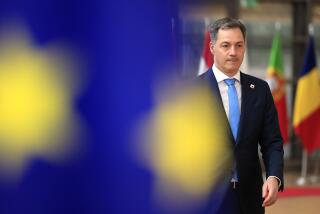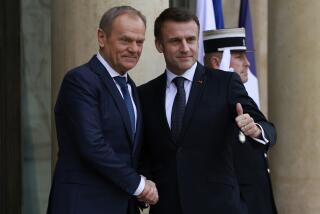Europe’s anger grows over alleged U.S. spying
LONDON — European leaders united in outrage Thursday over reported U.S. spying, with German Chancellor Angela Merkel declaring that trust between her government and the Obama administration would need to be rebuilt after reports that U.S. intelligence agencies might have tapped her cellphone.
Amid signs of anger from close allies over mass electronic surveillance, Germany’s Foreign Ministry also summoned U.S. Ambassador John B. Emerson to make clear its displeasure. Foreign Minister Guido Westerwelle said afterward that he had demanded that “these activities that have been reported will be comprehensively investigated. We need the truth now.”
Arriving at a meeting of European Union leaders in Brussels, Merkel said she had “repeatedly made clear to the American president [that] spying among friends is absolutely not OK. I said that to him in June when he was in Berlin, also in July, and yesterday in a telephone call.
“We need trust among allies and partners,” she said. “Such trust must now be built anew.”
Her anger was matched by that of other European leaders at the 28-nation meeting. “We want the truth,” Italian Prime Minister Enrico Letta was quoted as telling reporters. “It is not in the least bit conceivable that activity of this type could be acceptable.”
Merkel’s call with President Obama was his second such conversation this week — the first was with France’s president — in which the U.S. leader has had to soothe a European counterpart over revelations of spying on foreign nations on a gigantic scale by the National Security Agency.
German officials have poured scorn on the White House’s assurance that the U.S. is not currently monitoring Merkel’s cellphone and has no intention of doing so, a statement that, the officials noted, did not answer whether such eavesdropping had occurred. Merkel is known as an avid user of her cellphone for calls and text messages.
Her government has not elaborated on how it came to believe that the United States might have tapped her phone, but the German news magazine Der Spiegel says it sparked the chancellor’s concern with inquiries it made to her administration about suspected eavesdropping.
Obama’s earlier call to French President Francois Hollande came after a newspaper reported Monday that, according to documents leaked by former NSA contractor Edward Snowden, U.S. intelligence agencies had collected more than 70 million pieces of data on French phone communications within a 30-day period beginning at the end of last year.
A French government minister called such spying “totally unacceptable,” and Hollande’s government also summoned the U.S. ambassador to France for an explanation.
Whether the contretemps will cause any real or lasting damage to ties between the U.S. and its closest allies remains to be seen. Some analysts say the outraged reactions by leaders on the continent are more about posturing and catering to public opinion at home than a real rupture of relations in a world where countries, even allied ones, routinely spy on one another.
German Defense Minister Thomas de Maiziere made a point of saying in a television interview that “the Americans are and remain our best friends,” though he added the now-expected caution that spying by such a close ally was “absolutely not right.”
However, Martin Schulz, president of the European Parliament, said the Europeans should suspend negotiations for a free-trade agreement until the United States proved it could be trusted.
And Daniela Schwarzer, an analyst with the German Institute for International and Security Affairs in Berlin, said the atmosphere at the moment was brittle.
“The consensus in Germany is still that a good transatlantic relationship is what we want,” she said, but “the trust issue is still there.”
Schwarzer noted that negotiations for a free-trade agreement between the U.S. and Europe, known as the Transatlantic Trade and Investment Partnership, or TTIP, were dragged down this year as a result of Snowden’s disclosures.
“In France, the public debate went as far as being, ‘Look, we cannot possibly negotiate TTIP with America now, because they know everything about our strategy.’ So this goes very far in the political debate,” Schwarzer said. “Trust definitely needs to be rebuilt, and I think the Europeans will ask for something in the field of data protection where the U.S. needs to give something.”
U.S. officials declined Thursday to predict what Germany might do in response, but they noted that the two countries had agreed to work on intelligence privacy issues.
A spokesman for the German Embassy in Washington, Karl Bergner, said Germany was waiting for a U.S. explanation of what had taken place, and there has been no other official discussion of possible action by German officials.
“The ball is in the American court,” he said.
Times staff writer Paul Richter in Washington contributed to this report.
More to Read
Start your day right
Sign up for Essential California for news, features and recommendations from the L.A. Times and beyond in your inbox six days a week.
You may occasionally receive promotional content from the Los Angeles Times.






